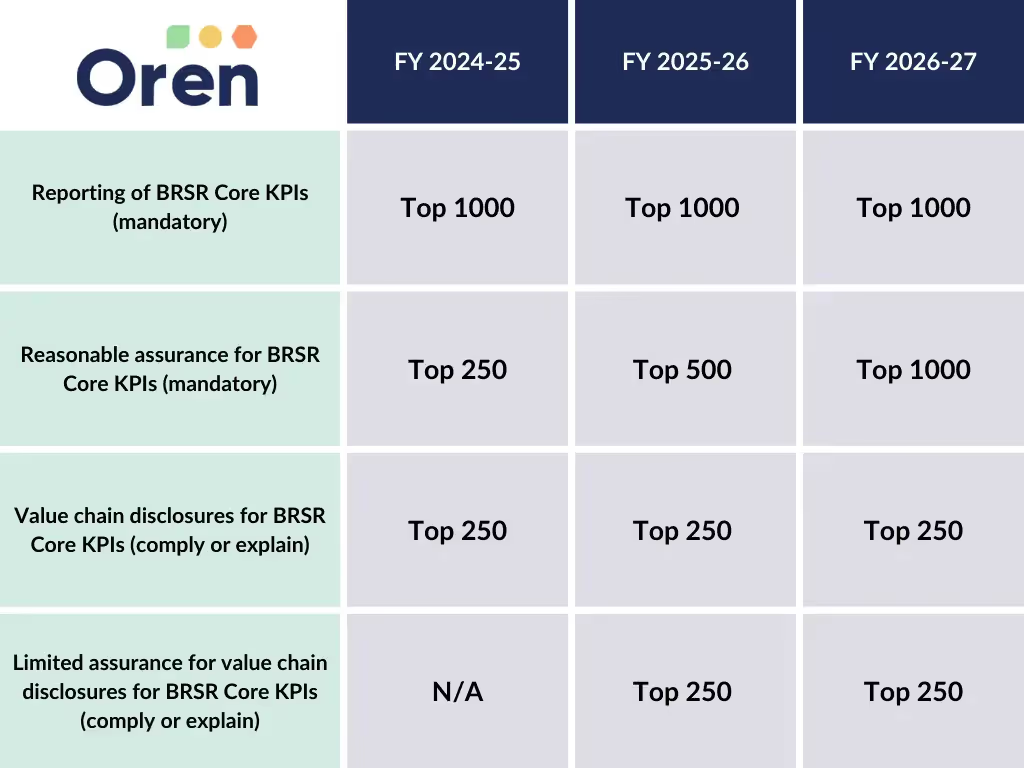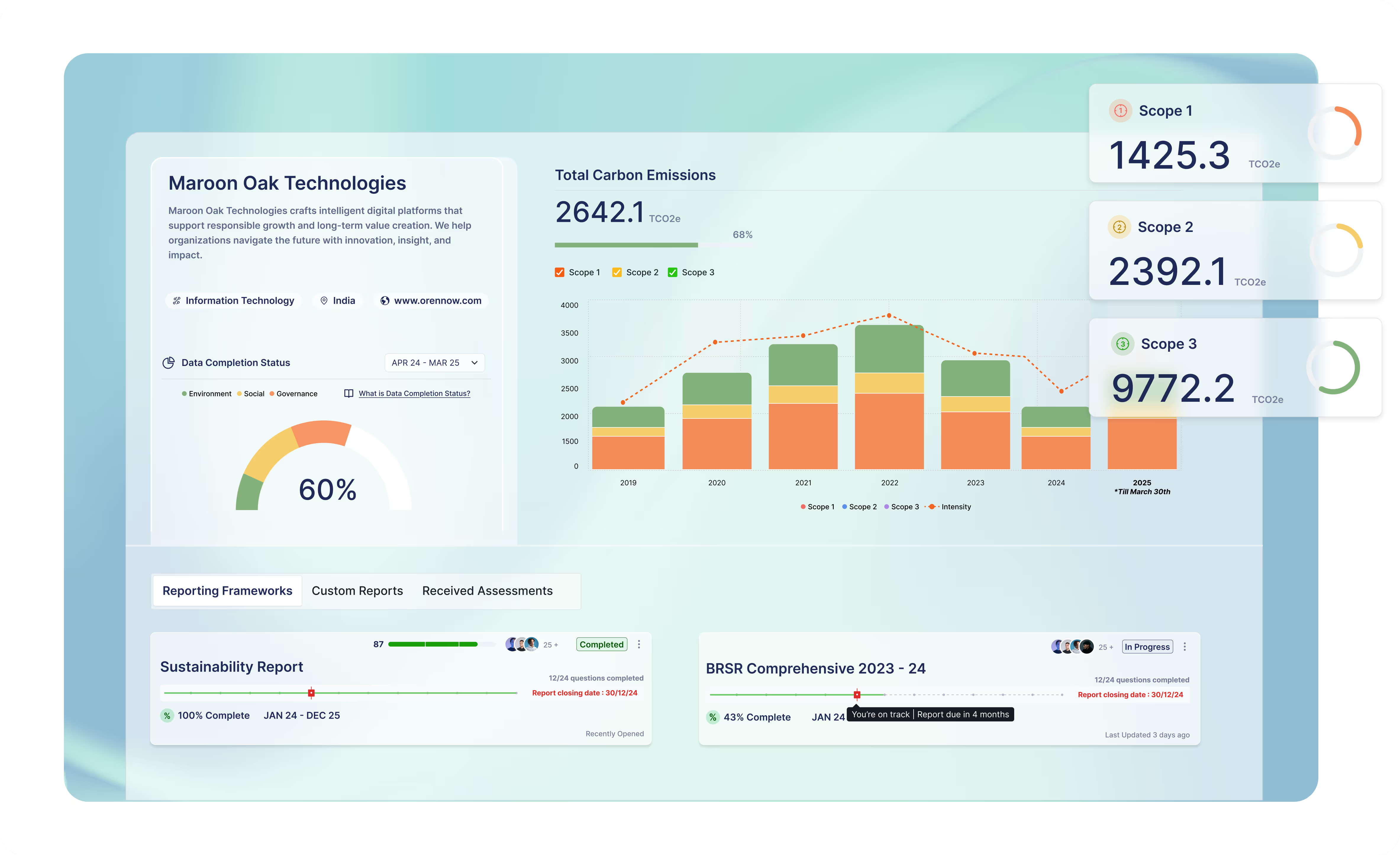Mastering BRSR Assurance: A Comprehensive Guide to SEBI’s Guidelines

In today’s rapidly changing business environment, corporate transparency is no longer limited to financial performance. Stakeholders—from investors to regulators and customers—are demanding a clearer view of a company’s Environmental, Social, and Governance (ESG) efforts. These factors are crucial as businesses navigate the transition towards sustainability. To ensure the accuracy and reliability of ESG disclosures, the Securities and Exchange Board of India (SEBI) introduced the Business Responsibility and Sustainability Report (BRSR) framework. A vital component of this framework is independent assurance, designed to enhance the credibility of disclosed data.
SEBI’s guidance on assurance within the BRSR framework sets the stage for companies to not only verify their ESG data but to do so transparently, ensuring that the assurance providers are independent and fully qualified. This article will explore SEBI’s rules on ESG, Assurance, and Audit, focusing on the role of the BRSR Core, how companies can ensure compliance, and the challenges associated with this framework.
The Growing Importance of ESG in Corporate Governance
The world of business is experiencing a paradigm shift as ESG factors rise to prominence. Gone are the days when financial performance alone determined a company's success. Today, stakeholders are deeply concerned about how companies impact the environment, treat their workforce, and uphold corporate governance standards.
Environmental aspects focus on a company’s carbon footprint, waste management practices, and efforts to combat climate change. Social concerns include labor practices, diversity and inclusion, community engagement, and overall corporate social responsibility. Governance covers corporate policies, board diversity, executive pay, and how transparent the company is in its decision-making processes.
The increasing importance of ESG disclosures reflects a broader movement toward sustainable business practices. In this context, frameworks like the BRSR are critical to standardizing the way companies report ESG data, offering stakeholders a reliable means to assess a company’s performance beyond financial metrics.
What is the BRSR Core?
The Business Responsibility and Sustainability Report (BRSR) is a framework designed by SEBI to help listed companies report on their ESG activities. It replaces the previous Business Responsibility Report (BRR) and provides a more structured, detailed framework for reporting non-financial data. At its heart lies the BRSR Core, a set of essential ESG metrics that listed companies must disclose.
The BRSR Core emphasizes several key areas:
- Environmental performance, such as emissions and energy use.
- Social aspects, including diversity, labor practices, and community engagement.
- Corporate governance, focusing on ethics, transparency, and board independence.
By focusing on these areas, the BRSR Core helps ensure that companies report on the most material ESG aspects of their operations, providing stakeholders with more consistent and reliable data for decision-making.

SEBI’s Guidance on ESG Assurance
In its guidelines, SEBI has underscored the importance of independent assurance for the BRSR Core. Independent assurance serves as a third-party validation of the ESG data disclosed by companies, ensuring that the data is accurate and credible.
1. Expertise in ESG and the BRSR Framework
One of SEBI’s key requirements is that assurance providers must possess the necessary expertise in ESG-related matters. It is not enough for an assurance provider to simply audit financial data. They must demonstrate a deep understanding of the ESG space, including knowledge of key environmental, social, and governance issues and how they relate to the company’s operations.
Assurance providers should be familiar with the metrics used in the BRSR Core, enabling them to provide an accurate assessment of a company’s ESG reporting. This requirement ensures that assurance is not just a box-ticking exercise but a thorough evaluation of a company’s sustainability efforts.
2. Independence of Assurance Providers
SEBI places a strong emphasis on the independence of the assurance provider. The guidelines specify that assurance providers must be free from conflicts of interest. For example, an assurance provider who has previously provided non-assurance services, such as consulting or project management, to the listed entity or its group entities cannot serve as the BRSR Core assurance provider.
This stipulation aims to prevent the auditor’s judgment from being influenced by other business relationships. It ensures that the assurance provider remains impartial and focused solely on the accuracy and reliability of the disclosed ESG data.
Timelines for BRSR Disclosure and Assurance
SEBI’s guidelines also outline clear timelines for the disclosure and assurance of BRSR Core data. Listed companies must ensure that their ESG disclosures are not only timely but also independently assured within the specified deadlines. These timelines play a crucial role in maintaining the relevance of the ESG data being reported.
By mandating specific timelines, SEBI ensures that companies are held accountable for their ESG performance in a timely manner. Stakeholders, including investors, regulators, and consumers, rely on this information to make informed decisions. Timely disclosures ensure that stakeholders have the most up-to-date and accurate data, helping them assess a company’s sustainability efforts more effectively.
Statutory Auditors as ESG Assurance Providers: The Double-Edged Sword
A noteworthy point in SEBI’s circular is the provision that allows statutory auditors of listed companies to also serve as ESG assurance providers for BRSR Core. This raises important questions about auditor independence and the potential conflicts that may arise from dual roles.
1. Benefits of Using Statutory Auditors
There are clear benefits to allowing statutory auditors to provide ESG assurance. Statutory auditors are already deeply familiar with a company’s financial systems and overall corporate governance. This knowledge can streamline the assurance process, as the auditor is already embedded within the company’s reporting framework.
From a logistical perspective, engaging the statutory auditor for ESG assurance can save time and resources, as the auditor is already conducting a detailed financial audit of the company. This approach can also lead to greater consistency between financial and ESG reports, as both sets of data are being evaluated by the same assurance provider.
2. Risks and Independence Concerns
However, this approach also has significant drawbacks, particularly regarding auditor independence. If a statutory auditor has provided non-audit services, such as risk management, advisory services, or consulting, to any part of the company or its affiliates, this can create conflicts of interest. These conflicts could compromise the auditor’s ability to provide an impartial assessment of the company’s ESG data.
In such cases, the statutory auditor may be disqualified from serving as the ESG assurance provider. SEBI’s guidelines place the responsibility of maintaining the auditor’s independence squarely on the shoulders of the company’s board and Audit Committee (AC). It is the AC’s duty to ensure that the statutory auditor’s role does not lead to any real or perceived conflicts of interest.
Assurance Standards: Flexibility or Risk?
Another critical aspect of SEBI’s guidance is the flexibility it provides regarding the standards companies can use for ESG assurance. SEBI allows companies to use globally recognized assurance standards such as the International Standard on Assurance Engagements (ISAE) 3000 or the assurance standards issued by The Institute of Chartered Accountants of India (ICAI), such as Standard on Sustainability Assurance Engagements (SSAE) 3000 or Standard on Assurance Engagements (SAE) 3410. However, SEBI does not mandate a specific standard, offering companies flexibility in their approach.
1. The Benefits of Flexibility
This flexibility allows companies to select the most appropriate assurance framework for their specific ESG data. Companies operating in different industries may have unique KPIs that require a tailored approach to assurance. The ability to choose an assurance standard that aligns with these KPIs ensures that the company can provide a more accurate and relevant assessment of its ESG performance.
2. Risks of Non-Compliance
While the flexibility to choose assurance standards is advantageous, it also introduces potential risks. If a company selects an assurance framework that SEBI later deems inadequate, the company could face non-compliance issues. This can lead to reputational damage and a loss of credibility with stakeholders.
To mitigate this risk, companies must carefully assess the standards they choose for assurance. They must ensure that the selected standard is not only globally recognized but also appropriate for the specific KPIs being assured. Transparency is also essential; companies should disclose any industry-specific methodologies or adjustments made during the assurance process.

The Role of the Audit Committee in Ensuring Independence
Given the complexities of the ESG assurance process, the role of the Audit Committee (AC) is more important than ever. The AC is responsible for overseeing the company’s assurance process, ensuring that the selected assurance provider is independent and qualified to perform the engagement.
1. Maintaining Auditor Independence
The AC must ensure that the statutory auditor—or any other assurance provider—remains independent and free from conflicts of interest. This is particularly important when the same firm is providing both financial and ESG assurance services. If the auditor has previously offered non-assurance services to the company, the AC must carefully evaluate whether this creates any real or perceived conflicts.
2. Transparent Reporting to Stakeholders
The AC is also tasked with ensuring that the company’s ESG disclosures are transparent and reliable. This includes overseeing the assurance provider’s work and ensuring that the selected assurance framework is appropriate for the company’s specific KPIs. By maintaining transparency and independence in the assurance process, the AC helps build trust with stakeholders and ensures the accuracy of the company’s ESG reports.
SEBI’s Broader Vision for ESG Reporting and Assurance
SEBI’s guidance on ESG assurance reflects a broader vision for enhancing corporate transparency and accountability. By mandating independent assurance for BRSR Core disclosures, SEBI aims to improve the credibility of ESG data and provide stakeholders with reliable information for decision-making.
This focus on assurance also aligns with global trends. Around the world, regulators are increasingly requiring companies to disclose ESG data and have it independently assured. SEBI’s approach not only ensures that Indian companies are held to the same high standards as their global counterparts but also encourages them to adopt more sustainable business practices.
Conclusion: Navigating SEBI’s ESG Assurance Guidelines
SEBI’s guidance on ESG assurance marks a significant step toward greater corporate accountability and transparency. By emphasizing the independence and expertise of assurance providers, SEBI ensures that companies report accurate and reliable ESG data. However, companies must carefully navigate these guidelines, especially when it comes to selecting assurance providers, maintaining auditor independence, and adhering to appropriate standards.
As ESG factors become increasingly critical to business success, companies must prioritize transparent and credible reporting. This involves selecting the right assurance provider, ensuring compliance with SEBI’s guidelines, and maintaining open communication with stakeholders. Ultimately, SEBI’s focus on ESG assurance will help companies build trust, enhance their reputation, and contribute to a more sustainable future.
FAQs
1. What is ESG Assurance?
ESG Assurance involves independent verification of a company’s ESG-related disclosures to ensure their accuracy and reliability.
2. Why is BRSR Core important?
BRSR Core focuses on key ESG metrics that provide transparency about a company’s sustainability efforts, allowing stakeholders to assess the company's non-financial performance.
3. Can statutory auditors serve as ESG assurance providers?
Yes, SEBI allows statutory auditors to serve as ESG assurance providers, but companies must ensure that there are no conflicts of interest.
4. What are ISAE 3000 and SAE 3000?
ISAE 3000 and SAE 3000 are internationally recognized standards used to verify the accuracy of ESG disclosures.
5. How can companies ensure compliance with SEBI’s assurance guidelines?
Companies can ensure compliance by selecting independent, qualified assurance providers and adhering to appropriate global standards such as ISAE 3000.
6. What is the role of the Audit Committee in ESG assurance?
The Audit Committee ensures the independence of the assurance provider and oversees the transparency and reliability of the company’s ESG disclosures.
Latest Blog Posts
Dive into our blog for insights on making your organization more sustainable.
Sustainability Simplified
Wherever you are in your sustainability journey, we help you advance with confidence.
Schedule a Call



.avif)

